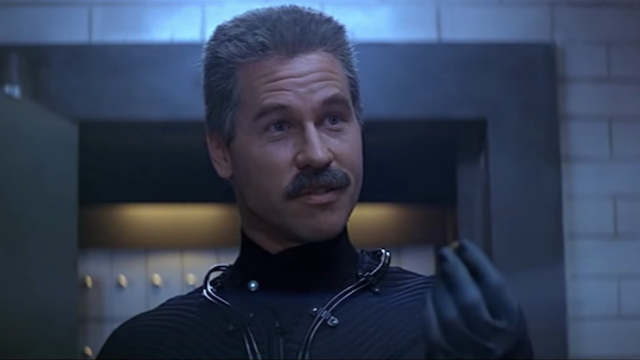
You might think that stealing money for a living would be a fulfilling occupation, but no! No sir or madam! It is actually lonely and sad. Another thing that is lonely and sad is Val Kilmer. This is as true now as it was in 1997, when he starred in “The Saint,” about a professional thief who gets soured on the whole idea of stealing after he has to steal from somebody nice. You wonder how he managed to stay in the business for so long if his threshold for moral dilemmas is that low.
The character, Simon Templar, comes from a series of pulp novels that were turned into a 1960s TV series starring Roger Moore. Thirty years after that, some people spent a lot of money to turn it into a bad movie. Turning TV shows into bad movies was a very popular pastime in those days, practiced by nearly everyone in Hollywood. What cocaine was in the ’80s, turning TV shows into bad movies was in the ’90s.
“The Saint” begins with our hero as a young boy in a mean Catholic orphanage, where the surly priest won’t let you eat dinner unless you acknowledge that you’re a wretched bastard. It’s all very “Oliver!,” albeit with less singing, and no one named Oliver, and more actual bastards. That night, young Simon (who’s named John at this point; don’t worry about it) is preparing to run away, but first he wants to kiss Agnes, a fellow orphan on whom he has a crush. He is in the process of doing this when the surly priest shows up with angry dogs, startling Simon and Agnes and causing Agnes to fall over the balcony to her death a few stories below. As always, we are impressed when a movie manages to kill a little girl for no good reason within the first five minutes. It’s a way for the filmmakers to send a message to the audience: “We are tone-deaf hacks who don’t know how to tell a story.”
Then it’s many years later. Simon has grown up into Val Kilmer, so he has that to contend with. Simon is a whiz at picking locks, in addition to being a master of disguise. He uses these skills for good, by which I mean he gets paid millions of dollars by bad guys to steal things from other bad guys. Usually it’s things like microchips, and usually at least one person is Russian. Rare was the action film in the 1990s that did not involve a Russian and/or the theft of a microchip. A villain will hire Simon to swipe something from another villain, Simon will use his excellent disguises to complete the task, and the money will be wired to his Swiss bank account. You might think that this would be a fine lifestyle, but again, no sir or madam, lonely and sad, etc.
A few words on Simon’s disguises. They are elaborate. They involve wigs, fake teeth, putty noses, and crazy accents. He is so good at changing in and out of these costumes that he can do it in a matter of seconds, without any advance preparation, and without having to stash the makeup and costume pieces beforehand. The movie wants us to take this seriously even though it follows the internal logic of a Bugs Bunny cartoon. You know how Bugs could reach into the empty air behind him and pull out an anvil? Simon can do that with false mustaches. You hear “master of disguise” and you think you’re in for a fun romp — you know, like that movie, “Mission: Impossible.” But instead it’s grim and unwatchable, like that movie, “Master of Disguise.”*
Simon’s current task is to steal a microchip (duh) from a Russian (duh) — specifically a Soviet-turned-billionaire named Ivan Tretiak (Rade Serbedzija) who wants to become Russia’s new president, or czar, or whatever Russia had in 1997. Tretiak doesn’t like that his microchip was stolen, but he does like the moxie with which Simon stole it. Communists-turned-capitalists admire chutzpah; everyone knows that. So Tretiak hires Simon to do a job for him, and Simon figures there can’t possibly be any harm in working for the ruthless Russian billionaire whom he just robbed.
The thing Simon is hired to steal is a formula for cold fusion. This is a mythical science-y thing that would solve all the world’s energy problems because you’d be able to provide electricity for an entire city with just a squirt gun full of water, or something. Tretiak happens to know that a scientist at Oxford has recently come up with this formula, and that having it would help him control all of Russia and the world, crush his enemies under his feet, and so forth.
But guess what! The Oxford scientist with the formula is a female lady woman scientist of the opposite gender! Her name is Emma Russell (Elisabeth Shue), and she is a lovable and eccentric nerd. Simon breaks into her apartment to learn everything he can about her, all the better to woo her and discover where she’s keeping the formula. Turns out Emma is a hopeless romantic, a fan of poetry, and a bit insecure when it comes to interactions with menfolk. Seizing upon this knowledge, Simon disguises himself as a sensitive artist with long hair, and flirts with Emma on the Oxford campus. To seal the deal, he pretends to have been injured by muggers, going so far as to slice his forehead with a pocketknife so that Emma can tend to his wounds fuss over him.
You’re thinking it is not wise for a man who is wearing a wig as part of an elaborate costume to cut himself so close to the hairline, much less to invite a woman he’s in the process of deceiving to examine the injury in detail. That’s like robbing a bank and, while you’re there, having them cash a check for you. Your concerns are invalid, however. Emma puts a bandage on the cut, has sex with Simon, and never notices that his hair is fake. For a scientist who has discovered the holy grail of modern science, she is not very observant. On the other hand, when she is devising formulas she is not distracted by Val Kilmer’s dreamy eyes.
It is after breaking into Emma’s apartment and reading Emma’s diary and manipulating Emma’s emotions and sleeping with Emma that Simon starts to feel bad about the way he’s treating Emma. He can’t back out of the plan, though, or Tretiak will just kill him and get somebody else to steal the formula, so he continues to lie to Emma and make her fall in love with him. Once she is completely smitten, he runs off with the formula, leaving her heartbroken and devastated. That’s our hero, ladies and gentlemen, in what Neil LaBute calls the cheeriest romance of the summer!
Now we enter the Loud Nonsense portion of the film. Most of what has transpired so far has been nonsense, but it has not been especially noisy. This new section is very loud, and very, very lengthy, and is made up of scenes where the Russians chase Simon to get the formula, and Simon wears a disguise and escapes, and the Russians chase him some more, and he has a few more disguises, and Emma tracks him down to confront him about his deception and to get her formula back, and Simon sort of apologizes for being a fraud but continues to be a fraud, and the Russians chase them, and they escape, and so on. As I said, this goes on for quite some time, all of it conveyed in a manner best described as intensely generic. The film wanted to be busy — but it also wanted to be unimaginative. The entire second half looks like the sole reason for its existence was to keep a team of crew members employed for a few extra weeks.
This is punctuated by brief moments, slightly less loud than the other moments, in which Simon and Emma discuss their relationship, which is evidently a legitimate thing now. He isn’t very tender with her, but that isn’t because he’s a bad person; it’s because he’s the hero in an action movie, and heroes in action movies have be “cool” (i.e., douchey) toward women. Emma keeps asking him, “Who are you? What’s your real name?” (Typical chick, always wanting to know your name, am I right?) He won’t tell her — won’t tell her anything about himself — but she stays loyal to him. If this were a romantic comedy, and being told from Emma’s point of view, we’d be waiting for her to realize this jerk is all wrong for her and choose Gerard Butler instead.
But what about Agnes, the young maiden who took a header off the orphanage balcony? What does she have to do with anything? Surely the film would not have included that unpleasant detail unless it was going to be relevant later. The subject is finally addressed when Simon and Emma are on the run together. While being pursued, they almost take a route that would involve jumping from a high place, but Simon has a brief flashback of Agnes falling, and they go another way instead, and that is the end of the Agnes thing, sorry.
Perhaps the Agnes thing is what made Simon a little cold toward women. If it is, rest assured that Agnes did not die in vain. For Simon and Emma are in love — her more than him, but still — and they’re going to run off together, as soon as they thwart the Russians and give the world cold fusion. Simon has made $50 million as an international thief-for-hire, which he figures is juuuust enough to be able to afford retirement. He’ll never be lonely or sad again, thanks to his taking advantage of a vulnerable woman with low self-esteem who doesn’t mind if he keeps huge secrets from her. This is definitely a guy who deserves sainthood.
*Joke stolen from “The Simpsons.”
— Film.com





